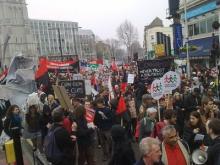La ‘Gran Sociedad’ del Reino Unido se levanta contra los recortes sociales
El pasado 26 de marzo la gente se lanzó a las calles en el Reino Unido para protestar y resistir los recortes sociales y los ataques a la clase trabajadora. Las cifras oficiales ya han admitido que sólo en Londres hubo unas 500.000 personas. Miles de organizaciones de todo tipo y color se organizaron en torno a una variedad de actividades que contó desde la marcha kilométrica de Blackfriars Bridge a Hyde Park, hasta la ocupación y ataques a empresas símbolo de la crisis económica y las injusticias en el sistema tributario, sin faltar la respuesta a las cargas policiales y los discursos soporíferos de los líderes laboristas.








